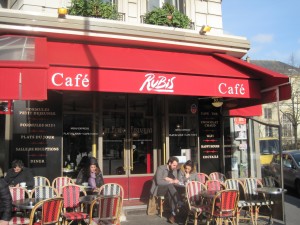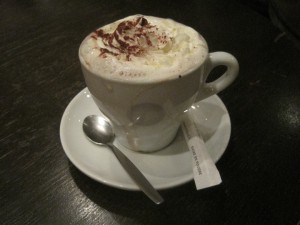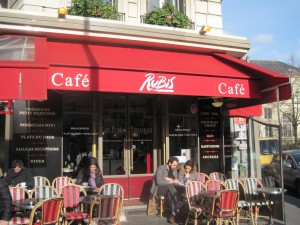
Whenever discussions in past CMWR events became heated, I knew I could rely on my ever-relatable, tattered crutch: I’m a language learner, too. Book Club already felt like a safe haven for English language learners and native speakers to dialogue freely. I wanted to reassure them that at the CMWR, we check our books out from the library and our judgment at the door.
During Book Club, I would encourage writers not to be ashamed of identifying new vocab words or taking their time to explain themselves. I’d justify just how sincere I was by admitting to my lackluster French vocabulary. Sometimes I couldn’t even define certain English words without having to look them up (or turn to another cheery Book-Clubber in anticipation). I used my situation unabashedly, as a way of empathizing with the sting of certain cultural differences or trials in language learning.
Now, “empathy” may be an understatement. Last night, while sitting in a plush Parisian café, the walls lined with red velvet couch cushions (I’m not kidding), I was living the experience that I so confidently tried to identify with at DePaul.
I’ve been living Paris for a week and a half now, and last night I participated in my program’s first “Club de Conversation.” Although the event has similar goals and intentions as the CMWR’s Conversation and Culture, it took place in a milieu très parisienne, Café Rubis, with refreshments to match. All the details I’m about to include are based in fact – I’m not merely musing about what a quaint French cafe might have to offer. Actually, I’d like to summarize this experience as “The Allegory of the Café.”
The allure of the café in France is that it provides a calm environment where one can sip on tea or chocolat chaud and do just about anything (except not finish your plate of food). It seems pretty informal, right? This informality lent itself well to our discussion at the Conversation Club. Instead of having several French speaking employees facilitate the discussion, the program assistant Jennie merely invites her French friends and local acquaintances or students each week. To make the conversation just about as authentic as possible, there’s no theme for the rendez-vous. All Jennie asks is that there’s no more than four Americans sitting with every one Frenchie.
The idea is to carry on a normal conversation in a genuinely French atmosphere without it seeming forced. I’ll admit, the surroundings were soothing and definitely evoked a sort of “je ne sais quoi”: warm yellow lights were posted on lacquered mirrors and set against deep colored walls. We ordered “chocolat viennoise,” a hot chocolate with the added delight of whipped cream gracing the bottom of the mug as well as the top.

Yet with the ratio of about ten Americans to one native French speaker, I couldn’t help but feel like I was again in a classroom, scrutinized for the numerous mistakes I was making. This is a phenomenon we adamantly try to avoid in the CMWR; we pride ourselves on peer-tutoring and deny the sort of didactic distance a professor can have with her students. The French girl more or less “assigned” to our group was extremely kind and casual; she corrected us once or twice if we made a glaring error. We all got to know each other (ehehhehe). What made me feel isolated and silly was the way I was constantly criticized my faults and edited my sentences before they would reach my lips. The cushion of the café, evidently, was not working to soften my shame. After several failures in French, I felt all the more aware and uncomfortable: basically the opposite of how you’re supposed to feel in a café in Paris.
But as I drained my cup of chocolat chaud, my hesitation evaporated as well. With my American comrades at my side, fumbling and butchering prepositions just as I was, the community effect that the classroom can provide began to comfort me. The Americans on the program share a native language and are undergoing varying dosages of culture shock. It’s a humbling experience for everyone. For example, I think we all agree that discussing French politics with a host family is about as unsavory as the gizzard meat we were forced to sample on our first “excursion.”
In the same light, it’s comforting to contribute something about your own culture. When the French girl said she had plans to travel to Chicago, I felt relieved to finally know the subject at hand.
Giving advice about home consequently increased my confidence and improved my French: “Don’t ride the red line alone at night, always go with the taquerias and the dive Mexican joints over the fancy restaurants…” Somehow all of this rolls right off my tongue in French (with the exception of “joints,” which I blurted out in my most typical Chicago accent).
At DePaul, most international students don’t have the luxury of sharing a common culture. At such a streamlined program like IES – for American students, with designated housing in homestays or apartments, organized dates and excursions – they furnish us with a much appreciated community that allows little room for major flops. I can’t fathom sojourning in this illustrious city solo (especially having to endure the major groan of finding an apartment and signing a lease!). For this, I salute the international students of DePaul. I also want to add that I have never empathized with you more.
If nothing else, these first two weeks have underlined the importance of cultural exchange. There’s no better way to navigate the maze of informalities and formalities in a new culture than by sharing part of your own identity, especially at first.
For now, I’ve moved on from passing around Laura’s scrumptious baked goods in the Lewis Center to stirring my beverage with a silver spoon. I can’t say yet if the refined casualty of the café suits me more than the stark white walls and child-sized desks of room 1718. What I do know is this: the boulangeries in Paris have nothing on her homemade brownies.
A la prochaine!
Gina O.
Discover more from UCWbLing
Subscribe to get the latest posts sent to your email.


One reply on “From homemade cookies to café au lait: My role reversal as an UCWbLer in Paris”
Very well written Gina! Sounds like a wonderful experience.